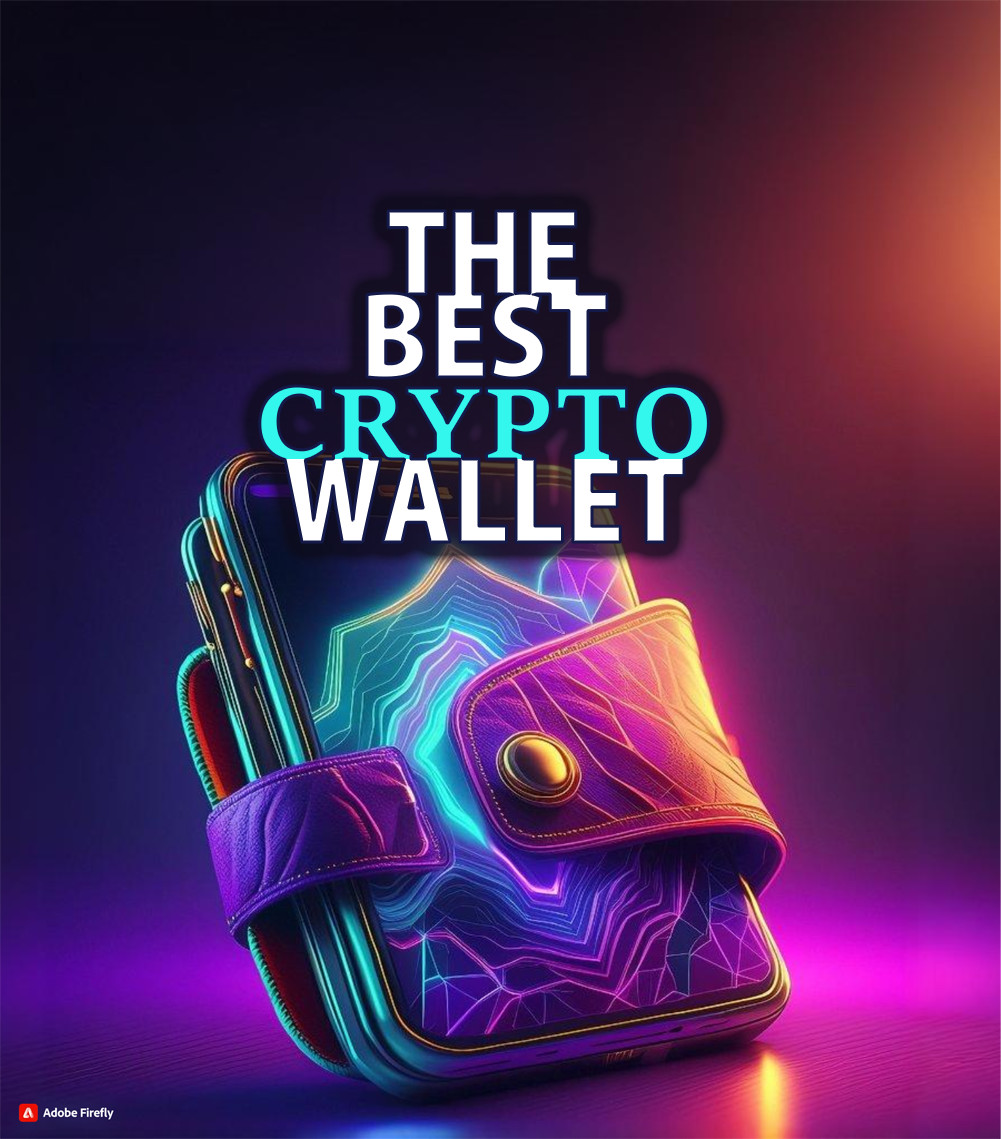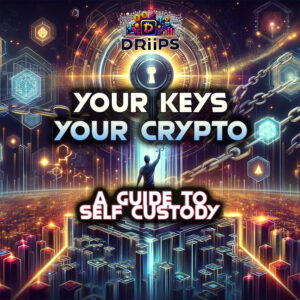In the world of cryptocurrency, having the best crypto wallet is key because that wallet is not just a place to store money; it’s a gateway to the decentralized world of digital assets. Crypto wallets are essential tools that enable users to store, manage, and transact with their cryptocurrencies securely. Unlike traditional wallets, which hold physical cash and cards, crypto wallets store private keys that allow users to access their digital assets on the blockchain.
When finding best crypto wallet, you must consider there are two main types of crypto wallets: hot wallets and cold wallets. Hot wallets are connected to the internet and are convenient for frequent transactions, while cold wallets are offline and provide a higher level of security for long-term storage.
Crypto wallets come in various forms, including software wallets (desktop, mobile, and web-based), hardware wallets (physical devices), and paper wallets (printed or written copies of keys). Each type offers different levels of security and convenience, catering to the diverse needs of cryptocurrency users.
In this guide, we’ll explore the different types of crypto wallets, how they work, and how to choose the best crypto wallet for your needs. Whether you’re new to cryptocurrency or a seasoned trader, understanding crypto wallets is essential for safely navigating the world of digital assets.
Software Wallets
Software wallets, also known as digital wallets or hot wallets, are applications or programs that allow users to store, manage, and transact with their cryptocurrencies. These wallets are connected to the internet, making them convenient for everyday use and quick transactions.
- Desktop wallets are applications that are downloaded and installed on a desktop computer or laptop. They offer a high level of security since they are not exposed to the internet all the time. Desktop wallets are a good option for users who prioritize security and are comfortable with managing their own software.
- Mobile wallets are apps designed for smartphones and tablets, allowing users to manage their cryptocurrencies on the go. They are convenient and easy to use, making them popular and the best crypto wallet for users who need frequent access to their funds. Mobile wallets are often used for everyday transactions and can store a wide range of cryptocurrencies.
- Web-based wallets, also known as online wallets, run on the cloud and can be accessed from any device with an internet connection. They are easy to set up and use, but users must trust the wallet provider to keep their funds secure. Web wallets are the best crypto wallet option for users who need to access their funds from multiple devices or locations.
Examples of Software Wallets
- Solfare Wallet: Solfare is a software wallet designed for the Solana blockchain. It offers users a secure and user-friendly way to store, manage, and interact with Solana-based tokens and decentralized applications (dApps).
- Phantom Wallet: Phantom is another software wallet specifically built for the Solana blockchain. It provides users with a seamless and secure way to store and manage their SOL and SPL tokens, as well as interact with the Solana ecosystem.
- MetaMask: While MetaMask is commonly associated with the Ethereum blockchain, it also supports other networks such as Binance Smart Chain and Polygon. It is a popular software wallet that allows users to manage their Ethereum and ERC-20 tokens, as well as interact with decentralized applications (dApps) on the Ethereum network.
- Trust Wallet: Trust Wallet is a multi-currency software wallet that supports a wide range of cryptocurrencies, including Ethereum, Binance Coin, and many others. It provides users with a secure and easy-to-use platform to store, send, and receive their digital assets.
- Atomic Wallet: Atomic Wallet is a multi-currency software wallet that supports over 300 cryptocurrencies. It offers users a secure and decentralized way to manage their digital assets, as well as built-in exchange capabilities for easy trading.
- Hyper Wallet : Hyper is a platform that revolutionizes crypto to crypto exchange utilizing both Telegram and a Mobile App. Sign in with Telegram, soon only with and email, and your wallet is connected to a multi chain exchange on your mobile.
Trade Bot Wallets

Trade bot wallets on Telegram serve as a unique and convenient option for cryptocurrency traders looking for a soft wallet solution. These wallets integrate with Telegram trading bots, allowing users to execute trades and manage their portfolios directly within the Telegram app. This setup offers several advantages, including accessibility from any device with Telegram, seamless integration with trading bots for automated trading strategies, and the ability to receive real-time trading notifications. Additionally, since Telegram is widely used and offers end-to-end encryption, trade bot wallets on Telegram can provide a secure environment for managing cryptocurrency assets.
Telegram Trade bots Generate a wallet inside the app. This can easily be linked to any other software wallet and seen on both platforms. Offering security, speed and a range of features including: Copy Trading, Launch Sniping, Limit Orders, Bridging, MEV Opportunities and Wallet Monitoring. These software wallets can be a powerful tool for any trader.
Simple sign up for Telegram, Get the app, Generate a wallet in the bot, send funds and start trading.
Best Crypto Wallet Apps: Telegram/Mobile
- TROJAN : BOT CHAINS: SOLANA +more soon
- XCeption : BOT Chains: ETH BASE *MEV & TRADE
- MAESTRO : BOT Chains: ETH BASE SOL ARB BSC AVAX
- HYPER : BOT Chains ETH BASE SOL OP BSC POLY DEGEN
- SIGMA BOT : BOT Chains ETH BSC AVAX ARD BASE BLAST
- SHURIKEN : Use BOT Chains ETH BASE SOL BSC ARB BLAST
These software wallets provide users with a convenient and secure way to store and manage their cryptocurrencies, each with its unique features and capabilities.
It’s essential to use reputable software wallets and follow security best practices, such as enabling two-factor authentication and keeping your wallet software up to date, to protect your funds. NEVER give anyone your keys, EVER.
Hardware Wallets
Hardware wallets are physical devices designed to store and manage cryptocurrencies securely. Unlike software wallets, which are online or digital, hardware wallets store the user’s private keys offline, making them less vulnerable to hacking and cyber threats. These devices typically look like USB drives and can be connected to a computer or mobile device to manage cryptocurrency transactions.
One of the key features of hardware wallets is their ability to generate and store private keys offline, away from the internet. When a user sets up a hardware wallet, a seed phrase is generated, which is used to derive all the private keys associated with the wallet. This seed phrase is essential for recovering the wallet if the device is lost or damaged.

To make a transaction using a hardware wallet, the user connects the device to a computer or mobile device, enters a PIN code, and confirms the transaction on the device’s screen. This process ensures that the private keys never leave the device, keeping them safe from unauthorized access.
Hardware wallets provide a high level of security compared to other types of wallets, making them ideal for storing large amounts of cryptocurrency for the long term. However, they can be more complex to use than software wallets and may not be as convenient for frequent transactions. Overall, hardware wallets are the best crypto wallet for users looking to keep their cryptocurrency holdings secure.
Examples of hardware wallets include:
- Ledger Nano S: Ledger Nano S is a popular hardware wallet that supports a wide range of cryptocurrencies. It features a small screen for transaction verification and physical buttons for navigation and confirmation.
- Ledger Nano X: Ledger Nano X is the successor to the Nano S, offering Bluetooth connectivity and a larger screen. It provides support for more cryptocurrency apps and allows users to manage their assets on the go.
- Trezor One: Trezor One is one of the original hardware wallets and is known for its security features and user-friendly interface. It supports a variety of cryptocurrencies and is compatible with several wallet apps.
- Trezor Model T: Trezor Model T is the newer version of the Trezor hardware wallet, featuring a touch screen for easier navigation and enhanced security features. It supports a wide range of cryptocurrencies and offers a sleek design.
- KeepKey: KeepKey is a hardware wallet that offers a large display for easy transaction verification. It supports over 40 cryptocurrencies and is known for its simplicity and security features.
These hardware wallets provide a secure and convenient way to store and manage cryptocurrencies, making the best crypto wallet choices among cryptocurrency users looking to protect their assets.
Paper Wallets

Paper wallets are a form of “cold storage” for cryptocurrencies, providing a way to store digital assets offline. They consist of a physical piece of paper that contains the public and private keys needed to access and manage cryptocurrencies. Paper wallets are considered one of the most secure methods of storing cryptocurrencies because they are not connected to the internet, making them immune to hacking and online threats.
To create a paper wallet, users generate a new wallet address and its corresponding private key using a secure method, often through a paper wallet generator website or software. The private key is then printed or written down on a piece of paper, along with the public address. It’s crucial to keep the paper wallet safe and secure, as anyone with access to the private key can control the associated cryptocurrency.
Paper wallets are typically used for long-term storage of cryptocurrencies that are not frequently accessed or traded. However, they can be cumbersome to use for regular transactions, as they require importing the private key into a software wallet to access the funds. Overall, paper wallets are the best crypto wallet option for storing cryptocurrencies offline, but users must take precautions to protect the physical paper from damage or loss.
Examples of paper wallets include:
- Bitaddress.org: Bitaddress.org is a popular open-source website that allows users to generate paper wallets for Bitcoin and other cryptocurrencies. Users can create a new wallet and print the paper wallet containing the public and private keys.
- WalletGenerator.net: WalletGenerator.net is another open-source platform that enables users to generate paper wallets for various cryptocurrencies, including Bitcoin, Ethereum, and Litecoin. It offers an easy-to-use interface and provides step-by-step instructions for creating and printing paper wallets.
- MyEtherWallet (MEW): MyEtherWallet is a widely used web-based wallet for Ethereum and ERC-20 tokens. While it primarily operates as an online wallet, it also offers an option to generate paper wallets for offline storage. Users can create a new wallet on MEW and choose to print the paper wallet containing the private key.
- Bitcoinpaperwallet.com: Bitcoinpaperwallet.com is a dedicated platform for creating paper wallets for Bitcoin. It allows users to generate a new wallet address and corresponding private key offline, providing enhanced security. Users can then print the paper wallet or store it digitally for safekeeping.
These examples offer different methods for generating and printing paper wallets, providing users with options for securely storing their cryptocurrencies offline. However, it’s essential to follow best practices for securing and protecting paper wallets to prevent unauthorized access or loss of funds.
Decentralized Exchanges
Decentralized exchanges (DEXs) are platforms that allow users to trade cryptocurrencies directly with one another without the need for an intermediary or central authority. Unlike traditional centralized exchanges, which rely on a central entity to facilitate trades and hold users’ funds, DEXs operate on decentralized blockchain networks.
One of the key features of decentralized exchanges is their use of smart contracts. Smart contracts are self-executing contracts with the terms of the agreement directly written into code. In the context of DEXs, smart contracts automate the trading process by matching buy and sell orders and facilitating the exchange of cryptocurrencies between users.
DEXs offer several advantages over centralized exchanges, including:
- Security: Since users retain control of their funds and trades are executed directly on the blockchain, DEXs are generally more secure than centralized exchanges, which are susceptible to hacking and theft.
- Privacy: DEXs often allow users to trade without needing to create an account or provide personal information, offering a higher level of privacy compared to centralized exchanges.
- Censorship resistance: Because DEXs operate on decentralized networks, they are resistant to censorship and cannot be shut down by a single entity or government.
- Reduced counterparty risk: Trades on DEXs are conducted peer-to-peer, reducing the risk of default by a central authority.
- Global access: DEXs are accessible to anyone with an internet connection, allowing users from around the world to trade cryptocurrencies.
Examples of decentralized exchanges (DEXs) include:
- Photon: Photon is a decentralized exchange on the SOLANA netowrk. Photon exists to make your crypto trading experience EASIER and FASTER. Our platform allows you to snipe, buy and sell in one click without ever having to navigate to Uniswap to trade. In the world of token launches and trading, every second counts, and it’s why so many people trust Photon to provide them with this edge in speed and execution when it comes to everyday trading.
- UniBot: Uniswap is one of the most popular decentralized exchanges built on the Ethereum blockchain. It allows users to trade ERC-20 tokens directly from their wallets using liquidity pools instead of traditional order books.
- Sphynx Labs DEX: Your all-in-one solution for crypto trading, farming, bridging, and beyond, empowering you to take control securely across any blockchain. Revolutionary DeFi App. Available on iOS/Android.
- SushiSwap: SushiSwap is a decentralized exchange forked from Uniswap that offers additional features such as yield farming and staking. It aims to incentivize liquidity providers by rewarding them with SUSHI tokens.
- PancakeSwap: PancakeSwap is a decentralized exchange built on the Binance Smart Chain (BSC) that allows users to trade BEP-20 tokens. It is known for its low fees and fast transaction times compared to Ethereum-based DEXs.
- Curve Finance: Curve Finance is a decentralized exchange optimized for stablecoin trading. It offers low slippage and low fees for trading between different stablecoins, making it popular among traders looking to swap stablecoins with minimal loss.
These are just a few examples of the many decentralized exchanges available in the cryptocurrency ecosystem. Each DEX has its unique features and trading pairs, catering to different needs and preferences of users.

In conclusion, selecting the best crypto wallet for decentralized finance (DeFi) involves considering several key factors. Security should be a top priority, with users opting for wallets that offer robust protection measures such as hardware wallets or reputable software wallets with strong encryption. Accessibility and ease of use are also crucial, with mobile and web wallets providing convenient options for managing DeFi assets on the go. Additionally, compatibility with the DeFi platforms and protocols you intend to use is essential, ensuring seamless integration and support for the assets you plan to trade or stake. Ultimately, choosing the best crypto wallet is a personal decision based on individual preferences and needs, but prioritizing security, accessibility, and compatibility will help ensure a positive DeFi experience.







Pingback: Getting Started With Telegram Trade Platforms: Powerful Crypto Trading Arsenals - Crypto Driips